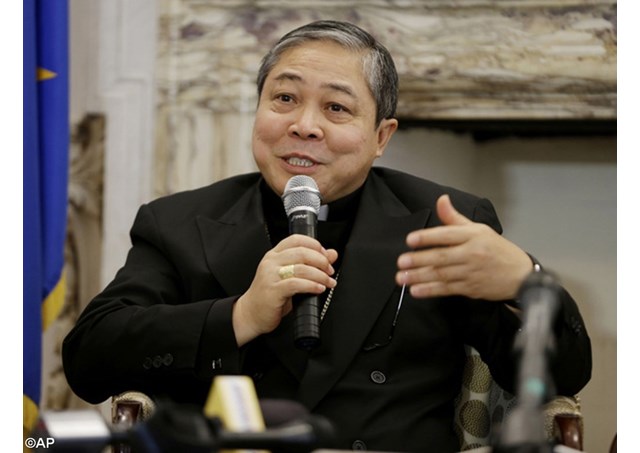
Vatican: Universal jurisdiction is an "important tool"

(Vatican Radio) The Vatican delegation to the United Nations this week spoke on the issue of universal jurisdiction at a session of the UN General Assembly.
It could be an important tool to ensure accountability and prevent impunity in case of serious violations of international humanitarian law and human rights, and to offer redress to victims,” – said Archbishop Bernardito Auza, the Permanent Observer of the Holy See to the United Nations – “When traditional bases of jurisdiction are unable to address some heinous crimes, and when no international tribunal has competence, universal jurisdiction could become a necessary tool.”
The Vatican diplomat said it is also important to safeguard the principle of universal jurisdiction from improper uses or ends.
“One such safeguard would be ensuring that its application take place in accordance with the Charter of the United Nations and international legal norms, including the sovereignty of States and national territorial integrity,” – Archbishop Auza said – “The use of universal jurisdiction to further political or ideological goals, or merely to intervene in the internal affairs of other States, would disregard principles of international law, including the sovereign equality of States. Such misuse of the principle would only bring the principle of universal jurisdiction into disrepute.”
The full statement is below
Statement by H.E. Archbishop Bernardito Auza
Apostolic Nuncio, Permanent Observer of the Holy See
Seventy-first Session of the United Nations General Assembly
Sixth Committee Agenda Item 85:
The scope and application of the principle of universal jurisdiction
Mr. Chair,
My delegation begins from the premise that universal jurisdiction, if it is well understood and
respects the principle of subsidiarity, has the potential to serve the common good and to
reinforce the protection of peoples. It could be an important tool to ensure accountability and
prevent impunity in case of serious violations of international humanitarian law and human
rights, and to offer redress to victims. When traditional bases of jurisdiction are unable to
address some heinous crimes, and when no international tribunal has competence, universal
jurisdiction could become a necessary tool.
The proper scope and application of universal jurisdiction is a complex issue and many
aspects of its scope and application still need to be defined and fine-tuned to gain legitimacy.
Many delegations have frequently pointed out to the Committee that the need for consistency
of universal jurisdiction is consistent with both the fundamental principles of criminal justice,
such as nullum crimen, nulla poena sine lege, the right to due process, the presumption of
innocence, etc., and with customary international law requires a concrete understanding of
when and why States could exercise jurisdiction over crimes committed outside of their
territory based neither on the nationality of the perpetrator nor the victim.
There is therefore a need to reach greater clarity on the conditions that should be place upon
the exercise of such jurisdiction of last resort, and to discuss how to safeguard national legal
systems, helping them to be fair, just and efficient; and on what ought to be the extent and the
admissibility of official immunities in universal jurisdiction cases.
My delegation thus recommends that the work of collecting expert opinions, of examining
case studies and of pursuing discussions on these questions should continue. This Committee,
with the collaboration of other bodies like the International Law Commission and the various
International Tribunals, is in a privileged position to further the discussions and debates on
these specific issues on which, in most cases, an international consensus still has to emerge.
There is therefore a need for increased mutual legal cooperation and sharing of experiences
learned in the application of the principle of universal jurisdiction.
Mr. Chair,
It is likewise important to safeguard the principle of universal jurisdiction from improper uses
or ends. One such safeguard would be ensuring that its application take place in accordance
with the Charter of the United Nations and international legal norms, including the
sovereignty of States and national territorial integrity. The use of universal jurisdiction to
further political or ideological goals, or merely to intervene in the internal affairs of other
States, would disregard principles of international law, including the sovereign equality of
States. Such misuse of the principle would only bring the principle of universal jurisdiction
into disrepute.
Mr. Chair,
My delegation will continue to follow with great interest the Committee's discussions on the
scope and application of the principle of universal jurisdiction, given the great potential good
that this principle could have in some specific situations of flagrant and massive violations of
human rights and international humanitarian law, Indeed, in cases where justice becomes
impossible to enforce at the national level, universal jurisdiction may be necessary to ensure
that atrocities against human rights and humanitarian law do not go unpunished.
Thank you, Mr. Chair.
| All the contents on this site are copyrighted ©. |


